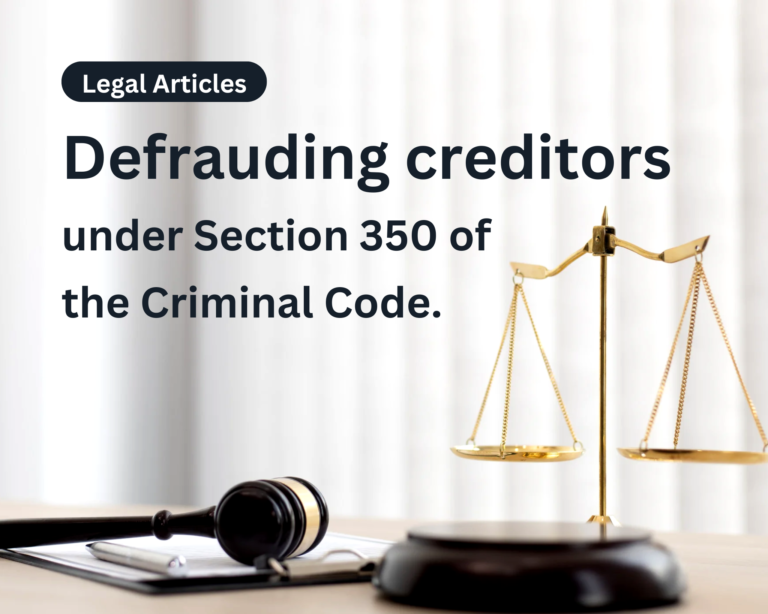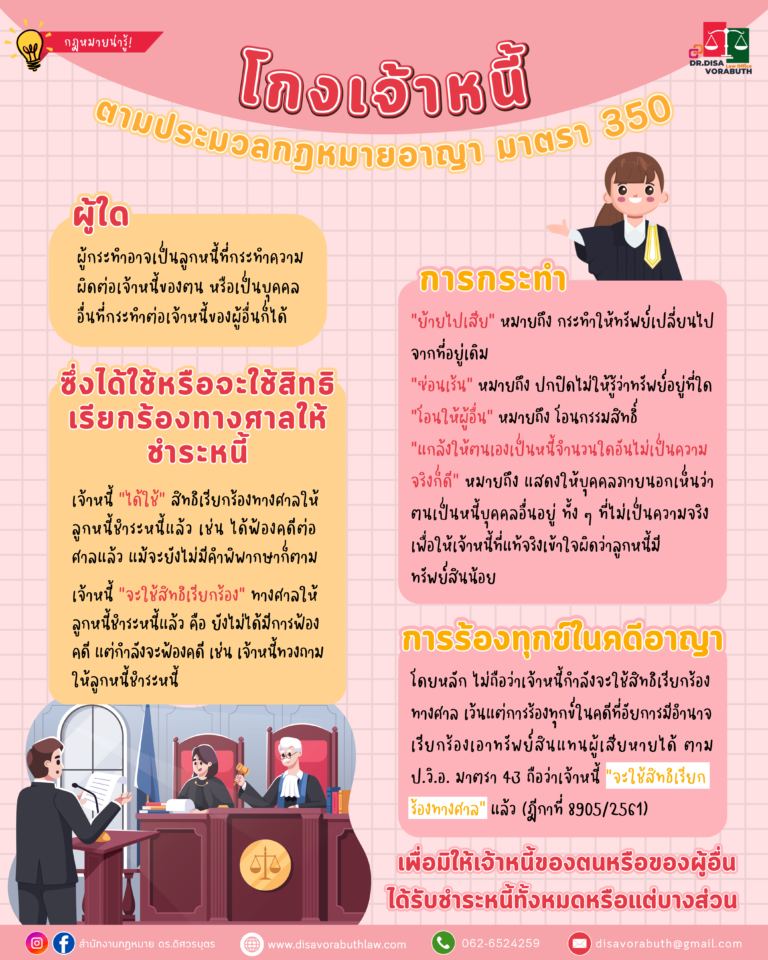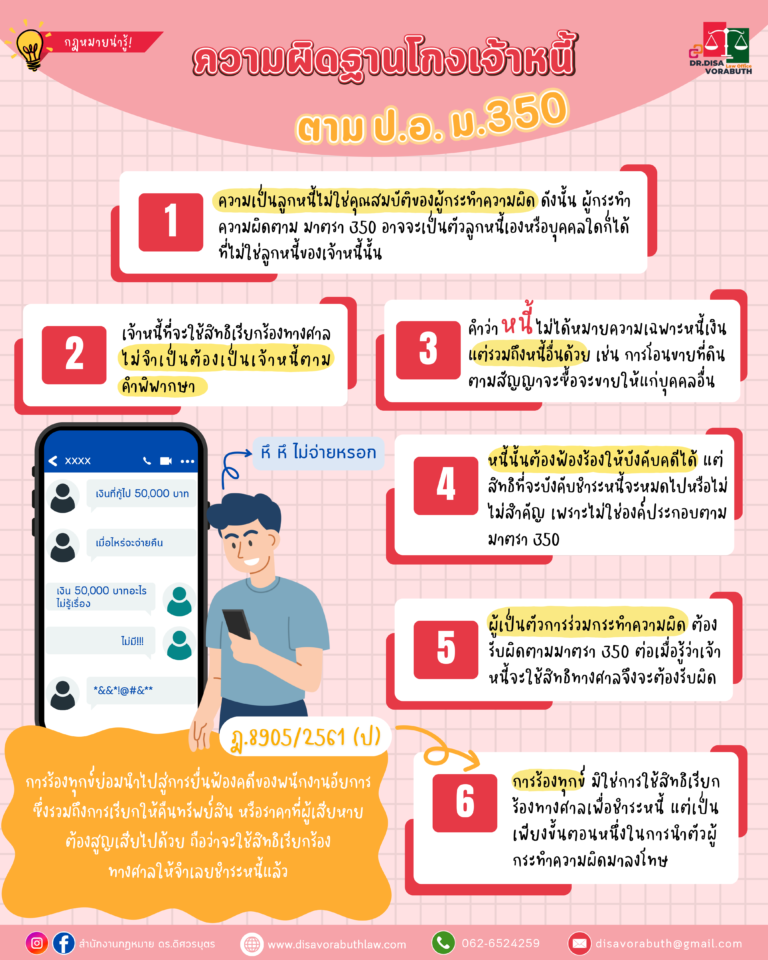[Penalty rate amended by Section 4 of the Act Amending the Criminal Code (No. 26), B.E. 2560 (2017)]
🔸 Whoever
The offender may be a debtor who commits an offense against their own creditor, or another person who commits an offense against someone else’s creditor.
🔸 Conduct
“Move away/Relocate” To move property from its original location.
“Conceal/Hide” To conceal or hide property so its location is unknown.
“Transfer to another” To transfer ownership of property to another person.
“Falsely claim to be indebted” To falsely represent oneself as being indebted to another party in order to mislead creditors.
🔸 who has taken or will take legal action to claim debt repayment
The creditor has exercised their right to claim debt payment through the court, for example, by filing a lawsuit, even if a judgment has not yet been rendered.
The creditor ‘will exercise’ their right to claim debt payment through the court, meaning they have not yet filed a lawsuit but are about to, for example, knowing the creditor is about to file a lawsuit, or the creditor has demanded payment.
🔸Filing a criminal complaint
As a general rule, a creditor is not considered to be about to exercise their right to claim through the court, unless a criminal complaint is filed in a case where the public prosecutor has the authority to claim assets on behalf of the injured party under the Criminal Procedure Code, Section 43. In such cases, the creditor is considered to ‘be about to exercise their right to claim through the court’ (Supreme Court Judgment No. 8905/2561), in order to prevent their own or another’s creditors from receiving full or partial debt repayment.
1) Being a debtor is not a qualification of the offender. Therefore, the offender under Section 350 may be the debtor themselves or any other person who is not the creditor’s debtor.
Supreme Court Judgment No. 143/2517: The term ‘another person’ under Section 350 of the Criminal Code refers to individuals other than the debtor. Defendant 1, being a judgment debtor to the joint plaintiff, transferred their land to Defendant 3, who was not a debtor to the joint plaintiff. Therefore, Defendant 3 is considered ‘another person’ within the meaning of Section 350.
2) The creditor entitled to pursue legal action is not required to be a creditor with a court judgment.
Supreme Court Judgment No. 1698/2535: The offense of defrauding creditors under Section 350 of the Criminal Code does not require a civil court judgment establishing liability as an element of the criminal offense. The elements of the criminal offense under this section are met when the offender, knowing that a creditor will exercise their legal rights in court to demand payment, moves, conceals, or transfers any property to another person, or falsely creates a debt, with the intention of preventing their own creditor or the creditor of another person from receiving full or partial debt repayment. This constitutes an offense.
3) The word ‘debt’ encompasses not only financial obligations but also other types of liabilities.
Supreme Court Judgment No. 755/2518 (Plenary): The term ‘debt’ as stipulated in the beginning of Section 350 of the Criminal Code does not refer exclusively to monetary debt, but also includes other forms of debt. Defendants 1 and 2 entered into a contract to sell land with title deed to the plaintiff. The plaintiff took possession of the land and paid the full purchase price, with only the transfer of the title deed remaining. The plaintiff is considered to be in a position to register their rights first, and is therefore a definite creditor of Defendants 1 and 2, who have a debt to transfer the land to the plaintiff. Defendants 1 and 2 then transferred and sold the land to Defendant 3, with all three defendants knowing that the plaintiff was about to sue Defendants 1 and 2. However, it was established that Defendants 1 and 2 had sufficient assets to pay the plaintiff’s damages, and had consistently paid other debts owed to the plaintiff without dispute. The defendants’ refusal to transfer the land to the plaintiff was due to differing interpretations of the contract, and not due to an intention to avoid paying the debt. Therefore, it is a matter of civil contract breach, not a criminal offense of defrauding creditors, and Defendant 3, as the purchaser of the land, is also not criminally liable. (Plenary Meetings No. 13/2517 and No. 2/2518)
4) While the debt must be subject to legal enforcement, the statute of limitations regarding the right to demand payment is immaterial, as it does not constitute an element of the offense under Section 350.
Supreme Court Judgment No. 1406/2512: The plaintiff lent the defendant 10,000 baht, and the defendant did not provide a written loan agreement. This constitutes a loan exceeding 50 baht without written evidence, which is prohibited from being enforced by legal action under Section 653 of the Civil and Commercial Code. Therefore, the plaintiff cannot exercise their legal rights against the defendant under Section 350 of the Criminal Code.
Supreme Court Judgment No. 6673/2537: The act of Defendants 1 and 2 transferring land to Defendants 3 and 4, knowing that the plaintiff would exercise their legal rights to demand debt payment and that Defendants 1 and 2 did not have sufficient remaining assets to pay the plaintiff, constitutes an action to prevent the plaintiff, their creditor, from receiving full or partial debt repayment. Therefore, they are guilty of defrauding creditors under Section 350 of the Criminal Code. Defendants 3 and 4, being the children of Defendants 1 and 2, and also knowing that the plaintiff would exercise their legal rights to demand debt payment from Defendants 1 and 2, received the land transfer from Defendants 1 and 2. Thus, they are guilty as principals, just like Defendants 1 and 2. Whether or not the right to enforce debt payment has expired is not an element under Section 350 of the Criminal Code. If it is established that all four defendants jointly acted to prevent their own creditor or the creditor of another person from receiving full or partial debt repayment, and the creditor has exercised or will exercise their legal rights to demand debt payment, then they have committed the act specified in this section. Therefore, all four defendants are guilty.
5) For an individual to be held as an accomplice in this offense, and therefore liable under Section 350, they must have had knowledge of the creditor’s intention to pursue legal action in court.
Supreme Court Judgment No. 563/2523: If a debtor transfers their land to another person to prevent the creditor from receiving full or partial debt repayment, and the creditor has already filed a lawsuit to demand payment, the debtor is guilty under Section 350 of the Criminal Code. As for the other person who receives the property transfer, they are guilty under Section 350 only if they knew that the debtor had a debt for which the creditor had already exercised their legal rights. If they did not know these facts, they are not guilty under Section 350.
6) Filing a complaint: The Supreme Court previously ruled that it does not constitute exercising legal rights in court to demand debt payment, but is merely a step in bringing the offender to justice. It was not considered that the creditor had exercised or would exercise their legal rights to demand debt payment. However, there is now Supreme Court Plenary Judgment No. 8905/2561 (P), which ruled that it does constitute exercising legal rights in court to demand debt payment. This judgment reverses the existing Supreme Court precedents.
Supreme Court Judgment No. 8905/2561 (Plenary): Filing a complaint with the investigating officer by the plaintiff for the offense of fraud leads to the public prosecutor filing a criminal case. Regardless of whether the plaintiff joins the public prosecutor as a co-plaintiff or not, it effectively constitutes a claim for the return of property or its value lost by the plaintiff due to the offense, with the public prosecutor acting on their behalf under Section 43 of the Criminal Procedure Code. The plaintiff does not need to demand or file a civil lawsuit to compel the defendant to pay the debt. Therefore, the plaintiff’s filing of a complaint is considered a case where the plaintiff will exercise their legal rights in court to demand debt payment from the defendant. (Plenary Meeting No. 24/2561).
With over 12 years of legal experience, we are the trusted experts you can rely on for all your legal needs. Our expertise spans across various legal fields, including civil and commercial law encompassing contracts, litigation, and legal proceedings; labor law to help your business avoid disputes; as well as family law, inheritance law, consumer protection law, intellectual property law, criminal law, and other legal matters. We also provide comprehensive legal consultation and registration services.
With over 12 years of legal experience, we are the trusted experts you can rely on for all your legal needs. Our expertise spans across various legal fields, including civil and commercial law encompassing contracts, litigation, and legal proceedings; labor law to help your business avoid disputes; as well as family law, inheritance law, consumer protection law, intellectual property law, criminal law, and other legal matters. We also provide comprehensive legal consultation and registration services.





